Related Research Articles

DEFA was the state-owned film studio of the German Democratic Republic throughout the country's existence.

Konrad Wolf was an East German film director. He was the son of writer, doctor and diplomat Friedrich Wolf, and the younger brother of Stasi spymaster Markus Wolf. "Koni" was his nickname.
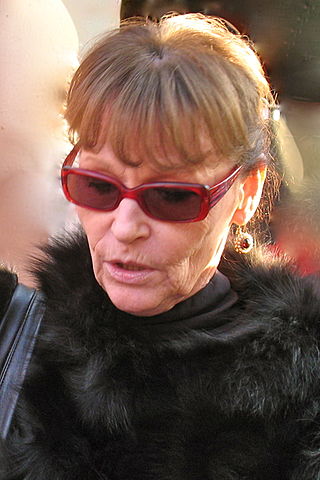
Angelica Domröse is a German actress, who became famous in the role of Paula in Heiner Carow's film The Legend of Paul and Paula. Her biological father was a prisoner of war from France.

Eva Strittmatter was a German writer of poetry, prose, and children's literature.

Thomas Heise, is a German documentary filmmaker.
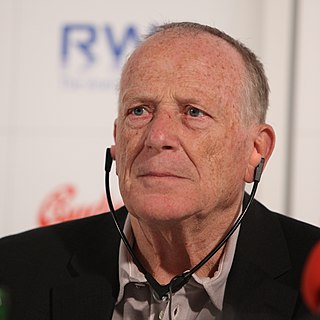
Wolfgang Kohlhaase was a German screenwriter, film director, and writer. He was considered "one of the most important screenwriters in German film history", and was one of the GDR's most well-known and prolific film screenwriters. Kohlhaase was awarded the Honorary Golden Bear at the 2010 Berlin International Film Festival.
Gisela Karau was an East German journalist and author of children's literature. Born in Berlin, she was married and had two children.

Günter Kochan was a German composer. He studied with Boris Blacher and was a master student for composition with Hanns Eisler. From 1967 until his retirement in 1991, he worked as professor for musical composition at the Hochschule für Musik "Hanns Eisler". He taught master classes in composition at the Academy of Music and the Academy of Arts, Berlin. He was also secretary of the Music Section of the Academy of Arts from 1972 to 1974 and vice-president of the Association of Composers and Musicologists of the GDR from 1977 to 1982. Kochan is one of eleven laureates to have been awarded the National Prize of the GDR four times. In addition, he received composition prizes in the US and Eastern Europe. He became internationally known in particular for his Symphonies as well as the cantata Die Asche von Birkenau (1965) and his Music for Orchestra No. 2 (1987). His versatile oeuvre included orchestral works, chamber music, choral works, mass songs and film music and is situated between socialist realism and avant-garde.

Eva-Maria Hagen was a German actress and singer. She was known as the "Brigitte Bardot of the GDR" but was banned from performance for political reasons.

Margaretha "Greta" Kuckhoff was a Resistance member in Nazi Germany, who belonged to the Communist Party of Germany and the NKVD spy ring that was dubbed the Red Orchestra by the Abwehr. She was married to Adam Kuckhoff, who was executed by the Third Reich. After the war, she lived in the German Democratic Republic, where she was president of Deutsche Notenbank from 1950 to 1958.
Andrew Thorndike was a German documentary film director. He directed 16 films between 1949 and 1977. His 1950 documentary, Der Weg nach oben, won the Best Documentary Film at the Karlovy Vary International Film Festival in 1951. He was a member of the jury at the 5th Moscow International Film Festival. At the 11th Moscow International Film Festival in 1979, he was awarded the Honorable Prize for his contribution to cinema.
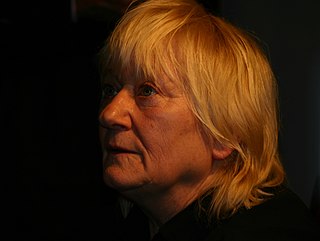
Carmen-Maja Antoni is a German actress.
Iris Gusner is a German film director and screenwriter.
Ariane Riecker is a German author and director of documentaries and reports. She is known for her documentary Mein Vater, der Türke in collaboration with Marcus Vetter.

Roswitha Trexler is a German operatic soprano and mezzo-soprano who became internationally known especially as an interpreter of the music of Hans Eisler and for her commitment to avantgarde vocal music.
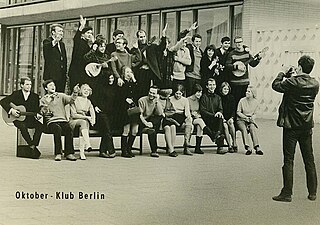
Oktoberklub, initially known as the Hootenanny-Klub Berlin, was a political music group from the German Democratic Republic (GDR). The musical style of the group was a mixture of folk, chanson and rock music. Founded in 1966, the group disbanded in 1990. Occasional performances followed in 2002 and 2007.

Michael Tschesno-Hell was a screenwriter and cultural official of the Deutsche Demokratische Republik.
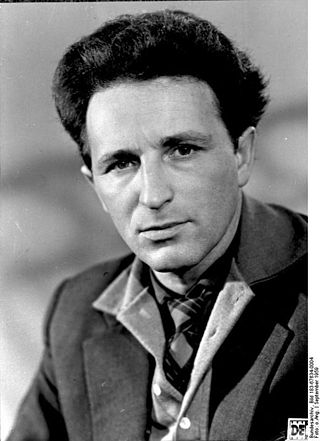
Paul Wiens was a German poet, translator and author of radio plays and screenplays in the German Democratic Republic.

Michael Kann is a German film director and actor. He was born in Berlin, East Germany, on 13 January 1950.
Joachim Werzlau was a German pianist, radio consultant and composer. He belonged to the first generation of composers in the GDR, where he was also active in organisations and politics. As a pianist, he played for the theatre, for Mary Wigman's dance school, and a kabarett, among others. He composed popular songs, music for audio plays, film scores, incidental music, and three operas. With films such as Nackt unter Wölfen and Jakob der Lügner, he was the most popular film composer of the GDR of his time.
References
- ↑ Günter Agde (2023-12-26). "Die Frauenfilmerin". nd (in German). Retrieved 2024-01-02.
- ↑ Wieland Becker und Volker Petzold: Tarkowski trifft King Kong – Geschichte der Filmklubbewegung der DDR. VISTAS, Berlin 2001, S. 438.
- ↑ Berliner Zeitung vom 16. Juni 1988, S. 7